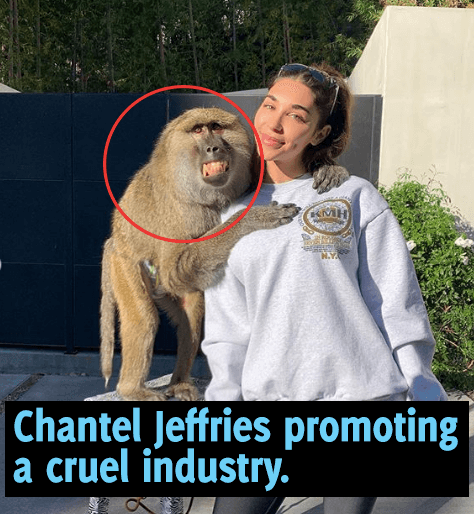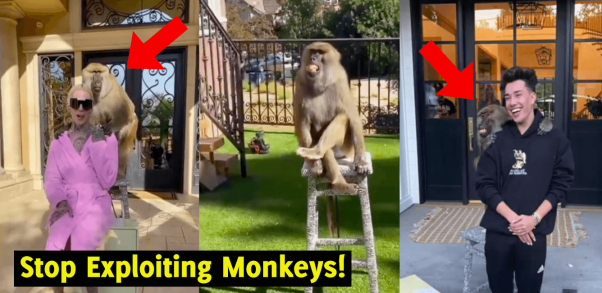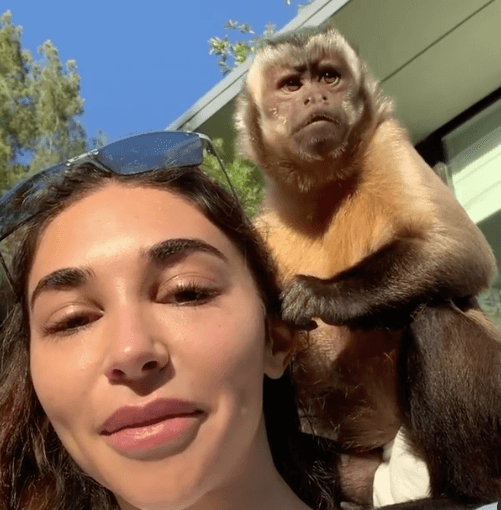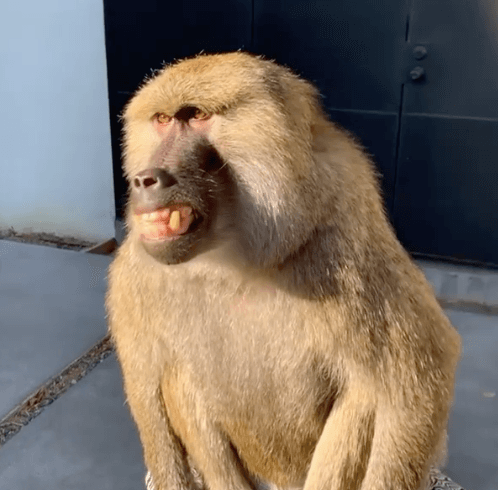Clothing brand Bananas Monkey carted two live monkeys—a baboon named Mickey and a capuchin named Chiquita—to the Los Angeles homes of influencers. Videos posted on social media show this bizarre and cruel promotion stunt. The only thing the twisted company promoted was speciesism: One of the monkeys was tethered to a barstool and grimaced as people shook his hand. Kevin Keith, the man behind these vile gimmicks, has a history of public endangerment. PETA submitted a complaint urging the U.S. Department of Agriculture to investigate the incidents, as they’re apparent violations of the federal Animal Welfare Act.
Beauty Influencers in Ugly Stunts
Exploiting defenseless monkeys in a beauty campaign is ugly. True beauty means treating others with respect and kindness—not putting someone on a leash and dragging them around a city for clout. Journalist Yashar Ali stated in a tweet, “Using primates like this is not only abusive, but also ends up encouraging private ownership of primates.”
1. A company called Bananas Monkey sent around a baboon & another monkey with PR boxes for its launch to influencers
Using primates like this is not only abusive, but also ends up encouraging private ownership of primates.@JeffreeStar @jamescharles @michaeleyerger @DaisyKeech pic.twitter.com/Up0D5Goz3a
— Yashar Ali
(@yashar) November 11, 2020
Among the influencers who are helping to fuel this harmful trade are James Charles and Jeffree Star. Charles already showed poor judgment when he bought a dog instead of adopting one from an animal shelter. There are over 70 million homeless dogs and cats struggling to survive on the streets in the U.S. alone, but Charles chose to support a breeder, fueling the companion animal overpopulation crisis. Star shared photos and videos of the publicity stunt involving the two monkeys with his 14 million followers on Instagram.
Terror Is Not Entertaining
Fashion never needs to include the suffering of sentient beings. Bananas Monkey and these influencers are gaining shame, not fame, as they promote an industry full of abuse. The exotic-animal trade tears baby monkeys away from their mothers and trains them through fear.
“Anyone who cashes in on an industry that separates baby monkeys from their mothers and forces them to endure miserable lives, subjected to cameras and cages, is ugly inside and out.”
—Debbie Metzler, PETA Foundation Associate Director of Captive Animal Law Enforcement
It’s industry standard for trainers to hit, chain, and yell at wild animals to get them to perform. Baboons like Mickey and capuchins like Chiquita should be living in African savannahs and South American rainforests, respectively, in large social groups with others of their species. Instead, Mickey the baboon has been forced to appear in commercials and TV productions. Keith, the supplier of both Chiquita and Mickey, has repeatedly been cited for failing to maintain direct control of primates during public exhibitions, including in 2014 and again in 2016 when a baboon was tethered to a platform and allowed to have direct physical contact with the public.
What Does It Mean When Monkeys Bare Their Teeth?
The “smile” shown by these monkeys is actually called a “fear grimace.” They’re trained to make this expression on command out of fear of punishment.
No monkey should be forced to perform for a fashion campaign or for movies or TV shows. Animals are not props, and no one should be exploited on social media for “likes.”
How You Can Help
Never promote cruelty to animals on social media, and always support vegan fashion brands.
The post New Clothes… and Live Monkeys? PETA Alerts Feds After Cruel PR Stunt appeared first on PETA.
Enviroshop is maintained by dedicated NetSys Interactive Inc. owners & employees who generously contribute their time to maintenance & editing, web design, custom programming, & website hosting for Enviroshop.




